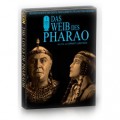| Reviews & Columns |
|
Reviews DVD TV on DVD Blu-ray 4K UHD International DVDs In Theaters Reviews by Studio Video Games Features Collector Series DVDs Easter Egg Database Interviews DVD Talk Radio Feature Articles Columns Anime Talk DVD Savant Horror DVDs The M.O.D. Squad Art House HD Talk Silent DVD
|
DVD Talk Forum |
|
|
| Resources |
|
DVD Price Search Customer Service #'s RCE Info Links |
|
Columns
|
|
|
Loves of Pharaoh (Das Weib Des Pharao)
Other (International) // Unrated // June 30, 2012 // Region 0
List Price: €38.80 [Buy now and save at Alpha-omega]
The Movie:
A lost Ernst Lubitsch spectacle, one of the last two films that he made in Germany before going to Hollywood, has been found, restored, and released on a lovely Blu-ray disc. The film is Das Weib des Pharao or The Loves of Pharaoh as it's known in English, is a large, impressive film filled with thousands of extras and some very striking sets (including a Sphinx!), but it will probably surprise followers of Lubitsh's American career. It's a historical drama rather than a witty comedy, the thing that he is fondly remembered for today. Even so, it's a larger-than-life production with an interesting story and some surprising twists that fans of early cinema should see.
Amenes, the Pharaoh of Egypt (played by the great Emil Jannings) has received a letter from Samlak, the King of Ethiopia (Paul Wegener). The King wants to sign a treaty with the Pharaoh and to seal the deal is coming with carts full of gifts as well as his daughter Makeda (Lyda Salmonova) who he will allow to marry Amenes.
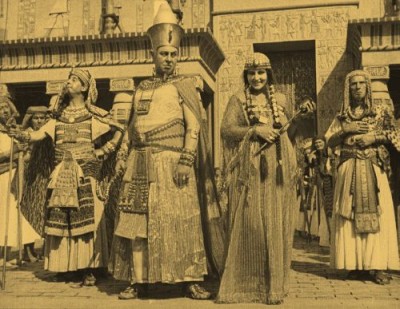
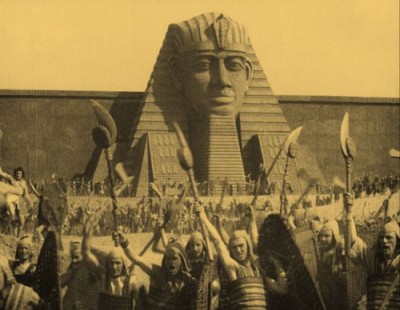
The Pharaoh is excited at this news and his new treasury is nearly finished which will be the perfect place to put his new wealth. He's pressing the architect, Solis, to complete the treasury as soon as possible, even though the pace is leading to accidents and killing the workers. What does he care as long as it's finished quickly?
Meanwhile the architect's son, Ramphis (Harry Liedke) is boating down the Nile when he spies an attractive slave girl, Theonis (Dagny Servaes) getting water for Makeda. He stops to talk to the beauty, and when the slave master discovers her gabbing starts to beat her. Ramphis knocks out the slaver and throws him in the water. After that affront Theonis is in danger so he steals her and takes her home to his father.
When Samlak arrives at the Egyptian capital, he presents his gifts and daughter, as well as complains about his stolen slave. Amenes vows to recapture the girl to prove that his country is lawful, and he soon does. When his eyes fall on Theonis however, he falls in love with her. He can't have her killed, but she's in love with Ramphis who is also slated for execution. The Pharaoh promises to spare her lover's life if she'll marry him, an agreement that she reluctantly makes.
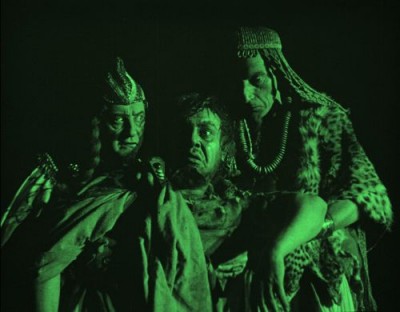
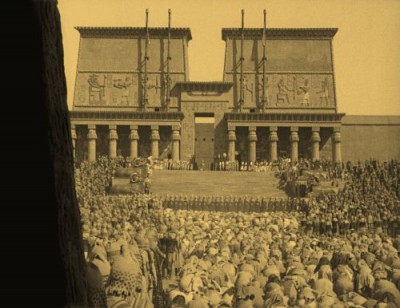
Pharaohs were not meant to love slave girls however, and this leads to trouble with the Ethiopian King who has an army ready to bring down the walls of the city over this slight.
With huge battle scenes, an entire Egyptian city built on a set, and a nearly life-sized Sphinx (well, the head at least) this is a spectacle picture, the kind that Europe was known for in the 20's. With the inflation rate being what it was in post-war Germany and the international markets willing to pay hard currency for films, it was easy for Lubitsch to hire an army worth of extras (two armies, actually) and create his impressive backdrops for the film. He also had discovered lighting techniques that were being used in America at the time to make movies look less 'flat' and he utilized these techniques extensively in this big-budget production. It is a marvelous film to watch.
The script is solid, though a bit weak on characterization, and includes some really surprises. Have seen my share of movies in my time, I was pretty sure how this love triangle would work out, especially after Amenes wed Theonis. We've all seen this 100 times, right? Apparently no one told the writers how a movie with a cruel king that loves a pure commoner should go however. There were a couple of twists that I didn't see coming, and that added a lot to my enjoyment of the film. It's always nice to be surprised by a plot.
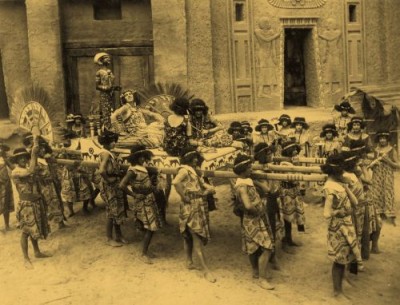
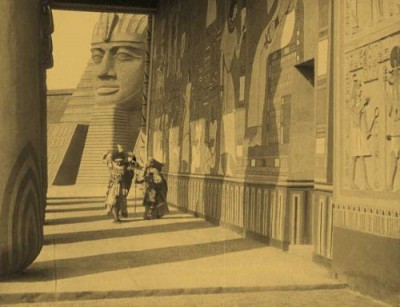
One warning, this isn't a totally complete film. There are still some 600 feet missing and some of those lost bits are important to the story. Luckily there are some stills (as well as the script) that still survive. In this presentation the missing footage is filled in with those stills and intertitle cards that describe the action in the scenes. This works well and it's easy to follow the storyline.
The DVD:
This Blu-ray disc (which is NOT region-locked so it is playable world-wide) comes in a beautiful custom box. The box opens to reveal an image of the Sphinx from the movie and the Blu-ray disc snapped into a tray. It's quiet a simple and effective package.
Audio:
As the film was being made, Ernst Lubitsch commissioned musician Eduard Kunneke to create a score for the movie, and luckily the music that he wrote still survives. The WDR Orchestra conducted by Frank Strobel performed Kunneke's score and it sounds magnificent. The DTS HD Master Audio 5.1 track reproduces music well and the result is powerful, impressive soundtrack.
The movie itself has intertitles several languages (German, English, French, Italian, Spanish, Russian, Chinese (not sure if they mean Mandarin or Cantonese), Japanese, Arabic, and Thai) which are selectable from the main menu. The original titles that were reproduced from the script are in blue while titles explaining missing footage are presented in white. It's a nice touch that works well and avoids confusion.
Video:
This film was restored from several sources and so the image quality varies a bit but it generally looks fantastic. The whole film was digitally restored at 2K resolution which means that each frame was scanned into a computer at a size of 2048 x 1536 pixels and then software was used to stabilize and clean up the image. They also reproduced the original tinting scheme inside of the computer. The result is a very nice looking Blu-ray disc. The small amount of footage that comes from 16mm sources has less definition, naturally, but in general the image is sharp, cliear and very stable. The people at Alpha-Omega have done a masterful job on this project.
Extras:
Alpha-Omega has included some nice bonus material with this film. The most engaging is a 38-minute documentary on the film. It's pretty comprehensive, discussing both Lubitsch and his place in German silent film and the restoration of the movie. Viewers who are interested in film history or the technical details of recreating a film's original look should make a point of watching it. There's also a full-length film of the WDR Orchestra recording the score, which I wasn't expecting at all. A 100-minute music concert is quite a nice extra. In addition to those there are two short reels of film stills (one containing stills from missing scenes) a trailer.
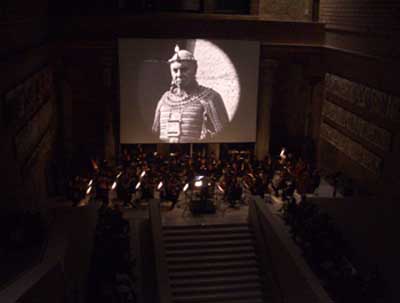
Included with the package is a 20-page booklet (in both German and English) that includes an essay on the film, an interview with the conductor who recorded the score, production photos, and more. This booklet is also reproduced on the disc.
Final Thoughts:
This long thought lost film is quite a spectacle. It's a beautifully mesmerizing movie to watch, especially for fans of the big production pieces of the 20's. People looking for a film with the "Lubitsch touch" will be disappointed, but those who enjoy grand films will find a lot to enjoy here. Highly Recommended.
|
| Popular Reviews |
| Sponsored Links |
|
|
| Sponsored Links |
|
|
| Release List | Reviews | Shop | Newsletter | Forum | DVD Giveaways | Blu-Ray | Advertise |
|
Copyright 2024 DVDTalk.com All Rights Reserved. Legal Info, Privacy Policy, Terms of Use,
Manage Preferences,
Your Privacy Choices | |||||||









